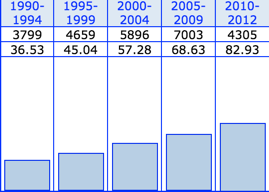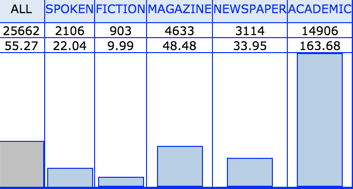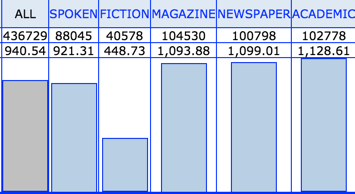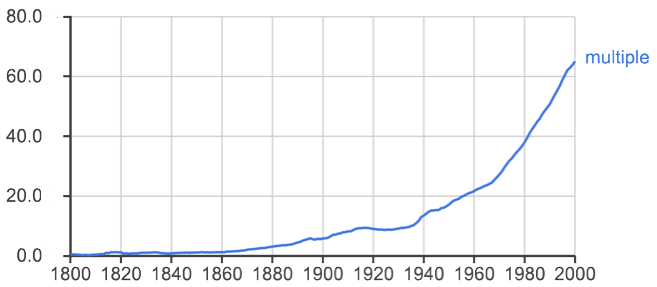Multiple
« previous post | next post »
John F. Banzhaf III writes to complain about overuse of "multiple":
Over the past six months I have heard an ever-growing number of TV news anchors, reporters, and talking heads on television use the word "multiple" where "many" – a shorter and less pretentious word – would do as well, if not better.
I would suggest that your remind people not to use the word "multiple" when many is what is meant, or is at least as good. Otherwise, the speaks sounds pretentious and perhaps pompous. A quick guide as to when to use each word would also be helpful to many of your readers.
This is not something that I've noticed, though perhaps I don't listen closely enough to enough talking heads. It does seem to be true that the use of multiple has increased fairly steadily over the past century and a half, from nearly nothing to a rate in the range of 60 to 80 per million words:
(I've used multiplication by 10,000 to turn the Google ngram viewer's uninterpretable percentages on the vertical axis into rates per million words…)
And a search in the COCA corpus confirms an increase continuing over the past 25 years or so:

It's also clear from the usage patterns across genres that multiple is a relatively fancy or formal word, almost five times as common in academic writing as in newspaper text:
| MULTIPLE | MANY | |
 |
 |
Logically, the secular trend towards increasing multiple usage could have one or more of several causes:
- Whatever multiple refers to in general (call it "multiplicity") is something that people are increasingly interested in talking and writing about;
- People are becoming more academic, formal or pretentious in their speech and writing;
- The academic or formal character of the word multiple is gradually being bleached away, so that people tend to use it in a wider range of contexts;
- The effective meaning of multiple in general usage is gradually shifting, so that it takes up more and more "mouth space" from alternatives like many, several, or numerous.
- Memetic drift (i.e. fashion) is increasing the frequency of multiple for no particular reason;
- Multi-word terms involving multiple have been invented and/or have increased in frequency.
Number 1 (increasing interest in multiplicity) seems unlikely, and number 2 (increasing formality) is clearly false. So we're left with number 3 (bleaching of register), number 4 (shifting connotation), and number 5 (memetic drift), which in cases like this can plausibly be seen as three different aspects of the same process; and number 6 (terminology), which is certainly true (e.g. multiple integral (1841), multiple sclerosis (1877), multiple personality (1886), multiple myeloma (1897), multiple regression (1908), multiple choice (1915), multiple exposure (1916) multiple intelligences (1983), etc.)
It seems to me that the core difference in meaning between multiple and many arises from the fact that multiple is in implicit opposition to single, while many is in opposition to few (which is still plural, and indeed more than two). So "a few gunshots" could still be described as "multiple gunshots", and "a few problems" could still be described as "multiple problems".
There are also several morpho-syntactic differences, including the fact that multiple is often used with a singular head noun, and many is used in constructions like "many a man". [Update: James points out in the comments that <i>multiple</i> is also starting to slip into the construction "multiple of X", by analogy to "many of X", "several of X", etc.]
Prof. Banzhaf suggests that multiple should involve repetition of events in a short time period:
To me, as a humble law professor who is no linguist, it seems that "multiple" implies – and may even mean – that something has occurred substantially more than once over a relatively short period of time: e.g., "multiple gun shots were heard," "multiple rescue attempts were made," In such situations, "multiple" seems better to use than "many."
On the other hand, I would say that there have been many (not "multiple") revolutions in France, that many (not "multiple") explorers tried to find an alternative route to India, etc. – even though there has been repetition over time.
Very clearly, where there is no reference to time, it seems that "many" is almost always correct. and "multiple" is always incorrect. For example, there are many coins in my pocket, many students in my law class, many books in my office library, etc.
I don't think that events and time periods are necessarily involved at all. Thus multiple regression involves predicting the value of a variable as a function of the values of two or more other variables, with no events separated in time for the multiple predictors. The theory of multiple intelligences divides the concept of intelligence into multiple abilities that are simultaneously present in a given individual. Multiple organ dysfunction syndrome involves simultaneous altered function in two or more organ systems.
But looking at hits for multiple in the current Google News index, I don't see any cases of the sort that annoy Prof. Banzhaf, where many would have been a better choice and multiple seems to be just a "pretentious" substitute. Perhaps some readers can suggest better ways to find such examples, and to determine whether their frequency is increasing.
(I do see lots of references to multiple-vehicle crashes, which might actually be evidence for a factor of type 1 in my list, namely a reason for people to be increasingly interested in talking and writing about multiplicity.)

Toby said,
December 19, 2014 @ 10:37 am
I am not aware of a problem with "multiple." The problem, if there is one, is with "numerous."
[(myl) Again, this observation doesn't ring a bell with me. Can you provide some evidence, or at least some examples?]
J. W. Brewer said,
December 19, 2014 @ 10:54 am
Your analysis of multiple-v.-single as contrasted with many-v.-few accounts well for Prof. Banzhaf's examples in the final paragraph of the block quote of what he considers bad usage (although we are then stuck with the question of whether his examples actually appear in the wild versus having been constructed for the occasion). It is highly unusual to have a single-student class or (at least if you are an academic) a single-book office library, and comparatively unusual to have one but only one coin in your pocket. There is thus probably some Gricean reason why one wouldn't want to focus on there being >1 student in a class or >1 book in an office, because that distinction would not typically be salient/newsworthy. One would instead want to focus the description along the fuzzier scale of few v. many. By contrast, single-vehicle accidents are quite common, and single-gunshot incidents are at least not uncommon.
AB said,
December 19, 2014 @ 11:00 am
I feel like "multiple" is sometimes used in news reports/ official statements where in everyday speech one would use "several"[gunshots, rescue attempts].
Does multiple sound somehow more precise, more authoritative?
(Cf "I have asked you several times" vs "I have asked you multiple times")
James said,
December 19, 2014 @ 11:17 am
I noticed some time ago that 'multiple' now has a determiner usage. (I think this is fairly new, but maybe that's recency illusion?)
A few examples:
tasklists don't work when including multiple of them from different pages.
Find word "Total" (multiple of them) and do a few actions in VBA
To increase battery voltage, wire multiple of them in series.
So I guess that's MYL's #4, although not exactly what he had in mind I think (my examples are of a different part of speech).
[(myl) Excellent point — I didn't think to look for "multiple of X" as a novel (I think) analog to "many of X", "several of X", etc. So there should be a disjunction ("meaning or syntactic distribution") in number 4, or maybe a 4a…]
J. W. Brewer said,
December 19, 2014 @ 11:37 am
Throwing "several" into the mix helpfully gets us away from the many-v.-few situation because several, like multiple, contrasts with single. I'm not sure if "more authoritative" is exactly the right description, but it does seem to me that you would use "multiple" if the multiplicity were, as implied in my prior comment, particularly salient or newsworthy. If I say "I have asked you multiple times" rather than "I have asked you several times" I am, I think, not primarily or merely using a more formal register; I am implying more strongly that having asked more than once was itself notable, i.e. more than might be reasonably expected, above and beyond the call of duty, something I shouldn't have had to do had you behaved appropriately, etc. "I've asked you repeatedly" would be another way to convey the same nuance. "Several" is more neutral as to whether doing it more than once was or was not noteworthy, but is helpful because it sidesteps characterizing the number of attempts as either "few" or "many."
M.N. said,
December 19, 2014 @ 11:56 am
One major difference between "multiple rescue attempts were made" and "many rescue attempts were made" is that "multiple" isn't gradable and doesn't give rise to an evaluative inference. If there were 3 rescue attempts, but we don't think that counts as a lot (like if there were at least 5 in every other comparable situation), "multiple" would be appropriate and "many" would not.
As J.W. Brewer said, the problem with the statives is just that the situations or utterance contexts are implausible. "Our linguistics department has multiple phoneticians on the faculty", for instance, sounds fine to me (if we want to make it clear that it's not the case that we only have one, or none at all — which would be way more plausible than a "library" with fewer than 2 books).
(Also, for what it's worth, I for one find the partitive examples totally ungrammatical.)
Toby said,
December 19, 2014 @ 11:59 am
myl,
thanks for asking. Well, now that I think about it, I wouldn't say that "numerous" is on the increase, necessarily. It's more that "numerous" is more pretentious, and is the word that tends to be used by a lot of people in my profession even though "many" seems perfectly fine. But I'm a lawyer, and pretentious language is what a lot of lawyers prefer by default.
Ralph Hickok said,
December 19, 2014 @ 11:59 am
I think it's originally copspeak. In my days as a police reporter (about 50 years ago), I saw many police reports about "multiple suspects," "multiple blows," "multiple gunshots," et al.
AB said,
December 19, 2014 @ 12:20 pm
Ah copspeak. "Multiple male individuals exited the vehicle and proceeded on foot…"
Jonathan Mayhew said,
December 19, 2014 @ 12:23 pm
When something has "multiple" causes, the implication is that there is not just one. But there are not necessarily "many" either. There could be five. "Several" does not quite get at the contrast with "one."
chips mackinolty said,
December 19, 2014 @ 12:33 pm
OK. Scattered through this thread is the word “several”, a word that I have always assumed is more than two (2) and, I don’t know, maybe up to six or seven (6 or 7), before it gets to “a lot”, or even “many” or for me, gratingly, “multiple”.
Thus when ABC News (Northern Territory Australia) [http://www.abc.net.au/news/2014-12-17/territory-woman-gladys-morris-celebrates-100th-birthday/5974448?section=nt]
runs a piece about a recent centenarian:
“She founded the Grey Panthers senior women's dance group in Darwin several decades ago”,
it seems linguistic, journalistic and mathematical definitions drift apart.
The Grey Panthers were established 26 years ago. I just cannot wear the notion that this is “several decades ago”.
Ø said,
December 19, 2014 @ 12:49 pm
I have heard of a different but perhaps related peeve. A colleague of a friend of mine objects to a phrase like "multiple gunshots" (meaning many or several gunshots) on the grounds that it is as bad as saying "double gunshots" when one means two gunshots. In his view, "multiple gunshots" properly means "gunshots, each of which is a multiple gunshot".
Ø said,
December 19, 2014 @ 12:53 pm
@chips: The Founding Fathers of the USA wrote of "the several states". On the other hand, my hunch is that in that phrase "several" meant something more like "separate" or "individual" or "considered one by one".
[(myl) The OED's glosses for several:
A.I. Existing apart, separate.
1.a. Having a position, existence, or status apart; separate, distinct.
1.b. Separate, distinct, or different from.
1.c. With reference to function or use: Distinctive, particular.
1.d. Acting separately or individually; having separate responsibility.
2. Qualifying a pl. n.: Individually separate; different.
]
D. Johnson said,
December 19, 2014 @ 3:13 pm
Might there also be the rationale "to increase the dramatic effect"? Certainly having my spouse tell me that I've forgotten our anniversary "multiple times" leaves me much more concerned than if she worded it as "a few times"!
Brett said,
December 19, 2014 @ 4:02 pm
@chips mackinolty: The range for "several" (among other terms) was covered by xkcd: http://xkcd.com/1070/
Mark F. said,
December 19, 2014 @ 4:22 pm
Copspeak sounds right to me, and I think it arose in that context because it only commits to there being more than one.
My sense is that jargon usually serves a function beyond mere in-group identification. I'd speculate that copspeak tends to subdivide the world a little more coarsely than common speech, since I assume they are supposed to be careful not to commit to more than they observe or get from eyewitnesses. That would naturally make its way into journalism, and that in turn would annoy people because committing-to-as-little-as-possible doesn't make for the best writing.
Rubrick said,
December 19, 2014 @ 4:25 pm
I was surprised to not see "multiple orgasms" in your cursory list of "category 6" multiple- terms. It certainly supports your "opposed to single" line of reasoning; "Do you experience multiple orgasms?" is quite different from "Do you experience many orgasms?"
Andrew Bay said,
December 19, 2014 @ 5:36 pm
I wonder if Multiple vs Many has anything to do with being subsets of a larger whole and somewhat connected to "multiple choice"
Multiple choice questions have several answers to chose from for each question.
In the case of multiple suspects, the greater set is that these suspects are for this case vs any other case. Multiple gunshots are from one shooting vs several shooting events.
Multiple Orgasms occur during one sexual event while many orgasms may occur over many events.
There were multiple rescue attempts for this one time of need of rescue vs there were many rescue attempts for a type of need.
So the general form would be "One [event] has had several of the same [action] occur"
Scott said,
December 19, 2014 @ 6:04 pm
My personal definition of "multiple" is definitely "more than one (as opposed to just one)", and I wouldn't consider it especially formal or pretentious; I wouldn't be surprised to hear a 6-year-old use it. Although it refers to numerical groups of similar size to "a few" and "several," I can't think of a situation where "multiple" and "several" would be equally acceptable and equivalent in meaning.
I think an emphatic "multiple" is used often in speech to emphasize the multiplicity of something, where just one would already remarkable. Looking through the Google news results, the headline "Boone teen accused of luring multiple children into restrooms" (here) seems like an example of this; in effect it's saying (to me) "Not only did a Boone teen lure a child into a restroom (which is already frightening), but he did this to other children, too." The version with "several" lacks this connotation.
Martha said,
December 19, 2014 @ 7:27 pm
My intuition is that "multiple" and "several" have the same meaning but that "several" is the more formal of the two.
Matt said,
December 19, 2014 @ 9:26 pm
I've used multiplication
Ugh, spare us the NewSpeak! What's wrong with "bemanying"?
Gregory Kusnick said,
December 19, 2014 @ 10:42 pm
Multiple as opposed to single has for decades been a staple of computer jargon, where one makes a deliberate design decision to accommodate multiple instances, multiple processors, multiple monitors, multiple users, etc., rather than assuming there will be only one.
So perhaps the increasing use of multiple among the wider linguistic community can be regarded as a species of nerdview gone native.
Marc said,
December 19, 2014 @ 11:00 pm
Has the use of the prefix multi- increased in parallel with the use of multiple? Multi-user. Multimillionaire. And my favorite, multihyphenate.
Scott said,
December 19, 2014 @ 11:46 pm
In support of the use of "multiple" as "more than one" originating from a technical meaning:
The word "multiplayer" refers to a computer/video game that can be played with multiple people, or a such a mode of a game, and is extremely common in the context of video games. I see this as an abbreviation for "multiple players". Any children playing video games (which there are a lot of these days) is likely to learn this term and reinforce the association "multi[ple]" = "more than one (where one might be expected)".
Adrian Morgan said,
December 20, 2014 @ 1:04 am
There is, of course, the obligatory Terry Pratchett quote:
"… waking up inside a body lying in a gutter with something multiple, the noun doesn't matter after an adjective like 'multiple', nothing good ever follows 'multiple' …"
Amusing anecdote: years ago, an online friend mentioned having multiple exams. I was reminded of the above quote, and said so. He agreed.
AB said,
December 20, 2014 @ 6:20 am
"nothing good ever follows 'multiple' "
Now we know that Terry Pratchett is a mediocre lover.
Will Thomas said,
December 20, 2014 @ 9:49 am
"Multiple news outlets report…." Meaning: "One said it, half dozen repeated it, and we're jumping on the bandwagon.
Ø said,
December 20, 2014 @ 10:06 am
I remember a book for very young children about colors, There was a page about RED, and a page about ORANGE, and so on. Near the end there was a page about MULTI-COLORS. This noun aroused a peevish impulse in me. I took it to be an unwelcome back-formation from the adjective "multicolored".
Sybil said,
December 20, 2014 @ 11:59 pm
I was first struck by the use of "multiple" (when "many" would do, or where I would have said "a number of") in student writing in my statistics course about 10 years ago. It certainly isn't a very recent thing, nor limited to news or "academic" writing. In fact, I feel the odd person out in that I can't bring myself to use it. It feels wrong, even though I can't figure out why. (It doesn't bother me too much when other people use it, but I do notice and pause.)
Bloix said,
December 21, 2014 @ 8:43 pm
Lawyers still use the older meaning of several when talking about liability, which can be either several or joint. If A and B are jointly liable to C for $100, then C can collect the full amount from either A or B – it's C's choice. If C can't find B, or B is bankrupt, C can still collect the full amount from A.
But if A and B are severally liable to C for $100, then C can collect only a fractional share from each – either $50 or another allocation according to a rule. And If B is missing or bankrupt, then C gets only A's several share.
As for "multiple," it doesn't mean many or numerous. It means two or more. It would make sense as copspeak, which is intended to remove all signs of subjective judgment. If you say "many," you are opening yourself up to an accusation of inaccuracy or imprecision on cross=examination: So, Mr. Cop, you heard four shots? Is that many to you? But multiple doesn't require a judgment call – more than one, that's all it implies.